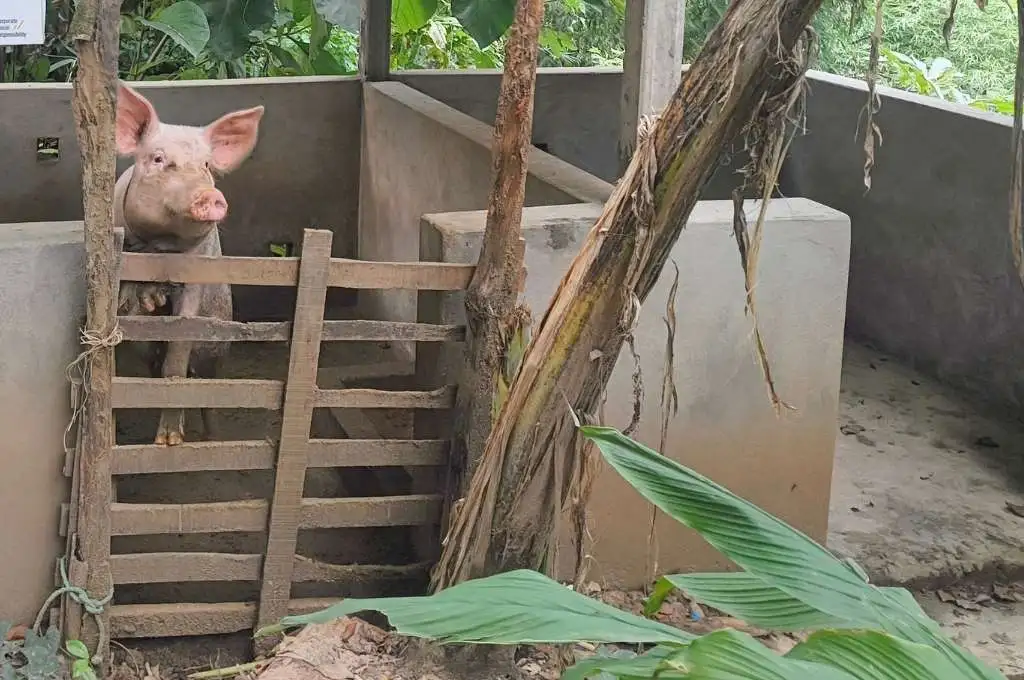Selling a pig in Tripura is more difficult than selling one in Assam

Seven Sisters Development Assistance (SeSTA), a nonprofit based in the Northeast, works to empower local farmers through various livelihood activities related to agriculture and livestock rearing, including pig farming. While the organisation’s work in Tripura began in 2017, they already had a developed model for pig farming in the neighbouring state of Assam. Initially, they implemented the same model in the rural areas of Tripura, but the challenges unique to the state led to modifications and the formation of a new low-cost model.
In Tripura, pig farming has been a traditional practice for many families, and consumption of pork is popular among people in the state. There is market demand for pork and, as of October 2024, it costs INR 500 per kg. However, the piggery business is still not profitable.
According to Shanti Bikash Chakma, an executive of SeSTA in Hezamara block of West Tripura district, the cost of pig farming in the area is significantly higher than in Assam. “The area we are working in is remote, which brings with it challenges such as difficulties with transportation, limited access to resources like building material, and higher labour cost for construction of pigsties compared to Assam. Additionally, feed prices and the cost of piglets are considerably higher.”
Highlighting her experience, Bhajakti Debbarma, a pig farmer from Hezamara block, says, “Constructing my two-room pigsty cost approximately INR 21,000, including labour and transportation expenses. I paid INR 15,000 for a six-month-old piglet. The feed for three months cost INR 2,700.”
In comparison, Shanti says that a pigsty costs INR 8,000 in Assam, a piglet is for INR 3,200, and the feed for six months costs approximately INR 2,100.
Market reach is also a huge issue. A survey conducted by SeSTA in a remote market of Assam’s Bongaigaon district found that even vendors from major cities in Assam, such as Guwahati, travel to remote markets to procure the produce, creating direct access between local farmers and buyers. In Tripura, vendors from larger markets rarely visit smaller village markets, leading to the emergence of middlemen who take advantage of the situation.
Limited market access means that the farmers are mostly dependent on the middlemen, which makes matters worse. Tarulata Debbarma from East Chandpur village in Hezamara block shares, “Traders come to our homes, and they manipulate the price. They estimate the pig’s weight without weighing it. We think the pig weighs more than they claim, but we have no option other than to sell it on their terms.”
She adds, “All the traders offer the same price with no room for negotiation.” Because of limited bargaining power, farmers are forced to accept whatever price is offered by the middlemen, leading to financial losses.
Since the business doesn’t make money, the farmers end up selling their pigs during financial hardships. This in turn limits their ability to grow their enterprises sustainably over time.
To address these issues, SeSTA is now focusing on establishing different farmer producer groups that can enable the creation of more direct links between farmers and buyers.
Anupam Sharma is an IDR Northeast Media Fellow 2024–25.
—
Know more: Learn how an additional school fee has become a cause of concern for parents in Tripura.
Do more: Connect with the author at neanupam@gmail.com to learn more about and support his work.



